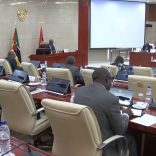Mozambique: New institute to manage public works
Mozambique: First quarter growth “almost lost” – Watch

Screen grab: Banco de Moçambique
The governor of the Bank of Mozambique, Rogério Zandamela, has said that the first quarter is “almost lost” in terms of economic growth, as a result of the prevailing post-election social unrest, and foresees only modest growth for 2025.
“In our forecast, the first quarter would be (…) almost lost, let’s say, in the sense that we had a very difficult situation,” Zandamela said. “In the best case scenario,” Mozambique would record “zero or probably negative growth” until March.
“But, from the second quarter onwards, our expectation is that the economy will start to grow and for the year as a whole, our forecast is […] modest growth,” Governor Zandamela forecasts, while stressing that performance is dependent on the implementation of structural reforms in the country.
The governor was speaking after the meeting of the Monetary Policy Committee (CPMO) of the Bank of Mozambique, which on Monday decided to further reduce the MIMO monetary policy interest rate from 12.75%, in force since the end of November, to 12.25%, also cutting the mandatory reserve coefficients.
“This decision is due to the maintenance of a single digit inflation outlook in the medium term, despite the increase in risks and uncertainties associated with the projections, in particular those arising from post-election tension, fiscal risk and climate shocks,” reads the final statement of the bi-monthly CPMO meeting.
“In addition, the CPMO decided to reduce the mandatory reserve coefficients for liabilities in national currency, from 39.0% to 29.0%, and in foreign currency, from 39.50% to 29.50%, with the aim of providing more liquidity to support the economy in restoring its productive capacity and the supply of goods and services” the statement continues.
The next Committee meeting is scheduled for March 26.
For months, Mozambican businesspeople have been calling for a reduction in reserves, claiming that the reduced availability of foreign currency creates constraints on imports.
The statement adds that inflation prospects “remain in single digits in the medium term”, recalling that in December “annual inflation increased to 4.15%, after 2.84% in November”, reflecting “the reduction in the supply of goods and services resulting from post-election tension”.
“Underlying inflation, which excludes fruit and vegetables and goods with administered prices, also increased. The maintenance of the inflation outlook in single digits in the medium term essentially reflects the stability of the metical and the impact of the measures taken by the CPMO,” it reads.
The statement highlights post-election tension, climate shocks and the worsening of pressure on public spending, in a context of reduced financing capacity, as factors for the increase in inflation in the medium term.











Leave a Reply
Be the First to Comment!
You must be logged in to post a comment.
You must be logged in to post a comment.